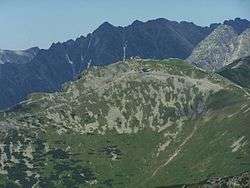Kasprowy Wierch
| Kasprowy Wierch | |
|---|---|
| Kasprov vrch | |
 Kasprowy Wierch (pl) Kasprov vrch (sk) - meteorological observatory | |
| Highest point | |
| Elevation | 1,987 m (6,519 ft) |
| Coordinates | 49°13′55″N 19°58′55″E / 49.23194°N 19.98194°E |
| Geography | |
 Kasprowy Wierch Location in Slovakia | |
| Location | Poland / Slovakia |
| Parent range | Western Tatras |
| Climbing | |
| First ascent | first winter tourist ascent by Klemens Bachleda and Karol Potkański in c. 1890 |
Kasprowy Wierch (Polish pronunciation: [kasˈprɔvɨ ˈvjɛrx]) or Kasprov vrch (in Slovak; sometimes English: Kasper Peak)[1] is a mountain in the Western Tatras. The mountain is also renowned as one of the most popular ski areas in Poland. Its peak is accessible by cablecar.
Geography
The mountain also delineates the border between Poland and Slovakia and it is possible to cross the border of each country, weather permitting. As both countries are part of the Schengen zone, it is not controlled or forbidden.
History
From 1910 onwards Kasprowy Wierch became very popular among ski tourists so much so an aerial tramway or téléphérique, reaching almost to the summit, was built between 1935-1936 as such it is one of the oldest in Europe. As part of its modernization, the cabin aerial ropeway was closed for a period until December 2007. In 1938 meteorological and astronomical observatories were built here. Users of the cable car have to change cars midway at Myślenicke Turnie mount. At the top station there are restaurants and information offices with further ski lifts just outside. The cable cars are extremely popular and tourists regularly have to wait up to 3 hours to buy tickets - roughly the same time it would take to ascend the mountain on foot. The cable car service has caused environmental concerns and protest both in 1935 and 2006. In 1961-1962 and in 1967-1968 chairlifts were built on the slopes of the mountain and they run in two sections.




References
- ↑ Nuclear Science Abstracts 15(23), 1961, p. 3994.
External links
- Zakopane - Kasprowy Wierch webcam
- Kasprowy Wierch cable-car - access information.
| Wikimedia Commons has media related to Kasprowy Wierch. |